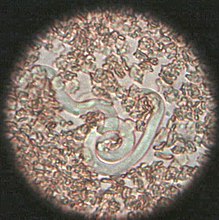Spirurida
 From Wikipedia the free encyclopedia
From Wikipedia the free encyclopedia
| Spirurida | |
|---|---|
 | |
| Dirofilaria immitis larva Magnification 400× | |
| Scientific classification | |
| Domain: | Eukaryota |
| Kingdom: | Animalia |
| Phylum: | Nematoda |
| Class: | Chromadorea |
| Order: | Rhabditida |
| Suborder: | Spirurida |
| Superfamilies | |
| 10, but see text | |
Spirurida falls under the phylum Nematoda class Chromadorea and order Spirurida. They are characterized by their elongated, cylindrical bodies and unsegmented structure. Like all nematodes, they have neither a circulatory nor a respiratory system.
Some Spirurida, like the genus Gongylonema, can cause disease in humans. One such disease is a skin infection with Spirurida larvae, called "creeping disease". Some species are known as eyeworms and infect the orbital cavity of animal hosts.
Systematics
[edit]The Camallanida are sometimes included herein as a suborder, and the Drilonematida are sometimes placed here as a superfamily. There are doubts about the internal systematics of the Spirurida, and some groups placed herein might belong to other spirurian or even secernentean lineages.[1]
The following superfamilies are at least provisionally placed in the Spirurida:
- Acuarioidea
- Aproctoidea
- Diplotriaenoidea
- Filarioidea
- Gnathostomatoidea
- Habronematoidea
- Physalopteroidea
- Rictularioidea
- Spiruroidea
- Thelazioidea
References
[edit]Citations
[edit]- ^ ToL (2002)
Sources
[edit]- Tree of Life Web Project (ToL) (2002): Nematoda. Version of 2002-JAN-01. Retrieved 2008-NOV-02.
External links
[edit] Media related to Spirurida at Wikimedia Commons
Media related to Spirurida at Wikimedia Commons